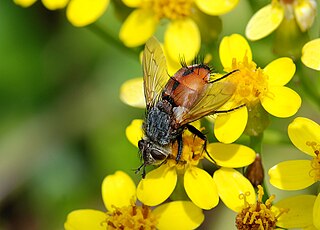
The Integrated Taxonomic Information System (ITIS) is an American partnership of federal agencies designed to provide consistent and reliable information on the taxonomy of biological species. ITIS was originally formed in 1996 as an interagency group within the US federal government, involving several US federal agencies, and has now become an international body, with Canadian and Mexican government agencies participating. The database draws from a large community of taxonomic experts. Primary content staff are housed at the Smithsonian National Museum of Natural History and IT services are provided by a US Geological Survey facility in Denver. The primary focus of ITIS is North American species, but many biological groups exist worldwide and ITIS collaborates with other agencies to increase its global coverage.

The Brachycera are a suborder of the order Diptera. It is a major suborder consisting of around 120 families. Their most distinguishing characteristic is reduced antenna segmentation.

Rapa, also called Rapa Iti, or "Little Rapa", to distinguish it from Easter Island, whose Polynesian name is Rapa Nui, is the largest and only inhabited island of the Bass Islands in French Polynesia. An older name for the island is Oparo. The total land area including offshore islets is 40.5 km2 (15.6 sq mi). As of the 2022 census, Rapa had a population of 451. The island's highest point is at 650 metres (2,130 ft) elevation at Mont Perahu. Its main town is Ahuréi. The inhabitants of Rapa Iti speak their own Polynesian language called the Rapa language.

Tāme Wairere Iti is a New Zealand Māori activist, artist, actor and social worker. Of Ngāi Tūhoe descent, Iti rose to prominence as a member of the protest group Ngā Tamatoa in 1970s Auckland, becoming a key figure of the Māori protest movement and the Māori renaissance. Since then, he has become a renowned activist for the rights of Māori and the process of co-governance and decolonisation.

Industrial training institutes (ITI) and industrial training centers (ITC) is a qualification and are post-secondary schools in India constituted under the Directorate General of Training (DGT), Ministry of Skill Development and Entrepreneurship, Union Government, to provide training in various trades.
In Buddhism, the bodhipakkhiyā dhammā are qualities conducive or related to awakening/understanding, i.e. the factors and wholesome qualities which are developed when the mind is trained.

The Engan languages, or more precisely Enga–Kewa–Huli or Enga – Southern Highland, are a small family of Papuan languages of the highlands of Papua New Guinea. The two branches of the family are rather distantly related, but were connected by Franklin and Voorhoeve (1973).
Peringome is a town in Kannur district in the Indian state of Kerala. It is 60 km north-east of Kannur town.
Sreekrishnapuram is a town within the Ottappalam Tehsil of Palakkad district in the state of Kerala, India.

ITI Limited, earlier known as Indian Telephone Industries Limited, is a central public sector undertaking in India. It is under the ownership of Department of Telecommunications, Ministry of Communications, Government of India. It was founded in 1948 as a departmental factory, incorporated as a public company in 1950 and today has six manufacturing facilities at Bangalore, Naini, Mankapur, Raebareli, Palakkad and Srinagar which produce a range of switching, transmission, access and subscriber premises equipment. It is headquartered at Bangalore. It has multi-locational electronic assembly and mechanical manufacturing facilities, countrywide marketing and customer support centers and in-house R&D for absorption of technology, indigenous development of products for in-house manufacturing. It produces GSM mobile equipment at its Mankapur and Raebareli facilities. These two facilities supply more than nine million lines per annum to both domestic as well as foreign markets. The Palakkad unit is responsible for data handling with assembly and personalization of smart cards and electronic manufacturing facilities for PCB's, HDPE Pipe, Smart Energy Meters, Micro PC under Smart City Mission etc. It also produces Information and Communication Technology (ICT) equipments such as network management systems, encryption and networking for internet connectivity, and secure communications networks and equipment for the defence. The company has 1608 employees as on June 1, 2024. On 01-10-2020, ITI Limited signed a contract with Defence to implement ₹7,796 crore ASCON Phase-IV project.

Psammobates is a genus of tortoise erected by Leopold Fitzinger in 1835. This genus contains three species, all of which are indigenous to southern Africa.

The International Theatre Institute ITI is the world’s largest performing arts organisation, founded in 1948 by theatre and dance experts and UNESCO.
Species 2000 is a federation of database organizations around the world that compiles the Catalogue of Life, a comprehensive checklist of the world's species, in partnership with the Integrated Taxonomic Information System (ITIS). The creation of Species 2000 was initiated by Frank Bisby and colleagues at the University of Reading in the UK in 1997 and the Catalogue of Life was first published in 2001. While administrators and member organizations of Species 2000 are located around the world, the secretariat is located at the Naturalis Biodiversity Center in Leiden, Netherlands.
Department of Industrial Training & Vocational Education, Haryana is a Ministry and department of the Government of Haryana in India.

Tubificida is an order of annelids belonging to the class Clitellata.
Ognev's serotine is a species of vesper bat found in western and central Asia.
Kozlov's long-eared bat is a species of vesper bat in the family Vespertilionidae. It is found in southern Mongolia and adjacent parts of China.
Strelkov's long-eared bat is a species of vesper bat found in mountainous regions of Central Asia.
Ward's long-eared bat is a species of vesper bat in the family Vespertilionidae. It is found in mountainous regions of South Asia and adjoining regions.









